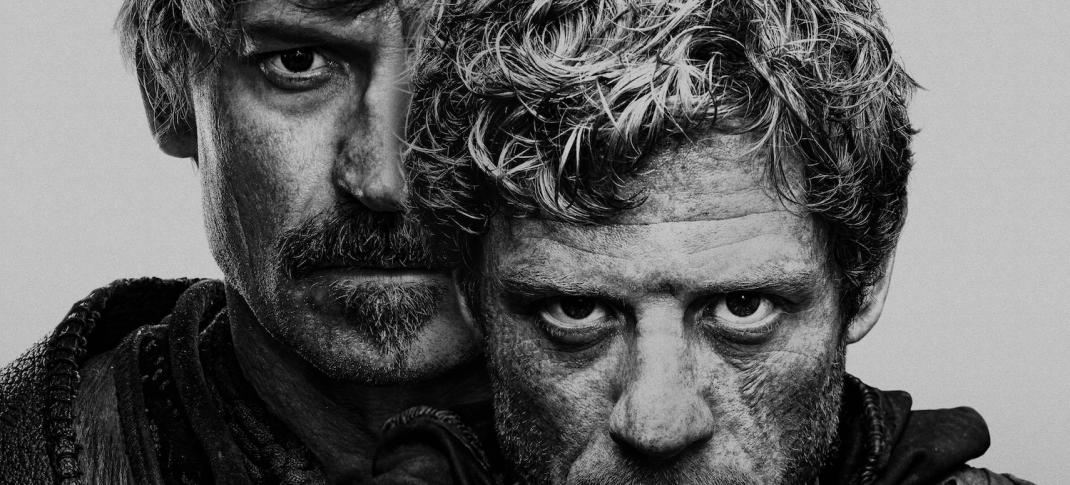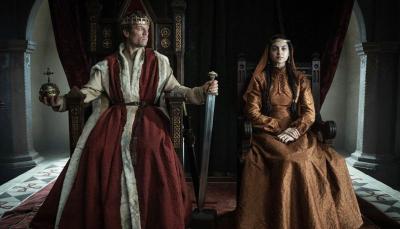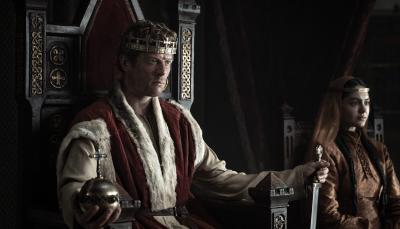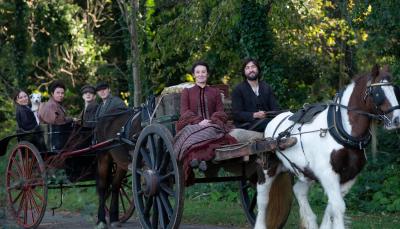Nikolaj Coster-Waldau & James Norton Face Off in 'King & Conqueror'

Nikolaj Coster-Waldau and James Norton in "King & Conqueror"
(Photo: BBC/CBS Studios)
"Power isn't given. Power is taken." So intones a voice in the first trailer for the BBC's forthcoming historical epic King & Conqueror, an eight-part re-imagining of one of the foundational moments in English history — but given a modern twist with plenty of violence, blood, and gore on top. The lavish series follows the story of two men whose battlefield face-off shaped the identity of England (as well as much of the future of Europe) for centuries afterward: Harold Godwinson (James Norton), Earl of Wessex, later known as King Harold II, and William (Nikolaj Coster-Waldau), Duke of Normandy, more commonly rememberd as William the Conqueror.
Though it's clear from the trailer that their paths inexorably lead to Godwinson's defeat at William's hands during the Battle of Hastings in 1066, the show appears to be just as interested in the identities of the two men at the heart of this fateful clash, and the relationship they once shared. And there's certainly plenty of drama to go around, including a complicated succession crisis, an interconnected family dynasty at war with itself, a shipwreck, a Viking invasion, and more.
When Edward the Confessor died, Harold Hardrada, the King of Norway, and William of Normandy both attempted to take the English throne. But the man who emerged victorious was Godwinson, brother-in-law of Edward, who managed to get himself crowned just a day after the king's death. This caused no shortage of inter-family strife: Harold, technically, wasn't a blood relative of the late king's, but was part of England's most powerful noble family, brother of the widowed queen, and influential in the English government. William was a cousin whosaid Edward had promised him the throne. But he was also a foreigner, having been raised in Normandy, and had no natural power base in England.
The result: Chaos and eventual bloodshed on an epic scale.
Here's the series synopsis.
King & Conqueror is the story of a clash that defined the future of a country – and a continent – for a thousand years, the roots of which stretch back decades and extend out through a pair of interconnected family dynasties, struggling for power across two countries and a raging sea. Harold of Wessex and William of Normandy were two men destined to meet at the Battle of Hastings in 1066; two allies with no design on the English throne, who found themselves forced by circumstance and personal obsession into a war for possession of its crown.
Alongside Norton and Coster-Waldeau, the series also stars Indy Lewis (Industry) as Margaret, Emily Beecham (The Pursuit of Love), Clémence Poésy (The Essex Serpent), Eddie Marsan (The Winter King), Juliet Stevenson (Professor T), Luther Ford (The Crown), Geoff Bell (Top Boy), Bo Bragason (Renegade Nell), and Clare Holman (Sherwood).
Supporting cast includes Jean-Marc Barr (Hope & Glory), Elliot Cowan (The Jetty), Bjarne Henriksen (Seaside Hotel), Oliver Mascucci (Fantastic Beasts: The Secrets of Dumbledore), Elander Moore (Kaos), Jason Forbes (My Lady Jane), Ingvar Sigurdsson (Killing Eve), Ines Asserson (Shetland), Sveinn Ólafur Gunnarsson (Stella Blómkvist), and Léo Legrand (Endless Night).
King & Conqueror is created and written by Michael Robert Johnson (Sherlock Holmes), with Baltasar Kormákur (Everest) directing the premiere episode and overseeing the series' creative. Both will also serve as executive producers alongside Norton and Coster-Waldau. Other executive producers include Kitty Kaletsky for Rabbit Track Pictures, Robert Taylor for The Development Partnership, Dave Clarke and Richard Halliwell for Shepherd Content, Ed Clarke, Robert Jones, and CBS Studios’ Lindsey Martin.
The eight-part series is set to premiere on BBC iPlayer and BBC One later this year. It somehow still does not have an American distributor, but international sales are being handled by Paramount Global Content Distribution. Fingers crossed for news on this front sooner rather than later.




